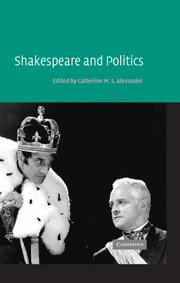Book contents
- Frontmatter
- Contents
- List of contributors
- Editor's note
- 1 Shakespeare and politics: an introduction
- 2 Shakespeare and politics
- 3 Henry VIII and the deconstruction of history
- 4 Livy, Machiavelli, and Shakespeare's Coriolanus
- 5 Richard II and the realities of power
- 6 Plutarch, insurrection, and dearth in Coriolanus
- 7 Some versions of coup d'état, rebellion, and revolution
- 8 Language, politics, and poverty in Shakespearian drama
- 9 ‘Demystifying the mystery of state’: King Lear and the world upside down
- 10 Venetian culture and the politics of Othello
- 11 The Bard and Ireland: Shakespeare's Protestantism as politics in disguise
- 12 Henry V as working-house of ideology
- 13 ‘Fashion it thus’: Julius Caesar and the politics of theatrical representation
- 14 Take me to your Leda
- 15 Macbeth on film: politics
- 16 William Shakespeare's Romeo + Juliet: everything's nice in America?
- Index
11 - The Bard and Ireland: Shakespeare's Protestantism as politics in disguise
Published online by Cambridge University Press: 05 June 2012
- Frontmatter
- Contents
- List of contributors
- Editor's note
- 1 Shakespeare and politics: an introduction
- 2 Shakespeare and politics
- 3 Henry VIII and the deconstruction of history
- 4 Livy, Machiavelli, and Shakespeare's Coriolanus
- 5 Richard II and the realities of power
- 6 Plutarch, insurrection, and dearth in Coriolanus
- 7 Some versions of coup d'état, rebellion, and revolution
- 8 Language, politics, and poverty in Shakespearian drama
- 9 ‘Demystifying the mystery of state’: King Lear and the world upside down
- 10 Venetian culture and the politics of Othello
- 11 The Bard and Ireland: Shakespeare's Protestantism as politics in disguise
- 12 Henry V as working-house of ideology
- 13 ‘Fashion it thus’: Julius Caesar and the politics of theatrical representation
- 14 Take me to your Leda
- 15 Macbeth on film: politics
- 16 William Shakespeare's Romeo + Juliet: everything's nice in America?
- Index
Summary
In his curious science-fiction novel entitled The Return of William Shakespeare, Hugh Kingsmill shows a remarkable understanding of the cultural forces that determine our picture of Shakespeare, of how this image is constructed and how it is inextricably interwoven with questions of political power. As a time-travel narrative, the book briefly holds out the promise of unmediated access to Shakespeare himself through the blessings of modern technology, but then proceeds to undermine the real possibility of ever recovering one authentic and objective truth, even within the fictional framework. In Kingsmill's novel, Shakespeare is transported from the year 1607 to the novel's present, the nineteen-twenties, by some unspecified process. As it turns out, however, the ‘reintegrated’ Shakespeare is depressed, and hardly presentable to the general public: he cries much of the time, speaks in ‘an odd lingo, and accent you could cut through with a knife’ (51), and worst of all, he does not remember anything. However, there are pressing reasons, not the least financial, for presenting Shakespeare to the public; and so a conspiracy is set up among the organizers of the time travel experiment to disguise one of them, a PR man, as Shakespeare. Unlike the real Shakespeare, the imposter ‘corresponded roughly to the generalized impression the ordinary Englishman has of Shakespeare’ (69).
It is through the contrast between the fake Shakespeare, acceptable to the modern audience, and the real one, nearly dumb and hard to communicate with, that the novel makes its main satirical points.
- Type
- Chapter
- Information
- Shakespeare and Politics , pp. 185 - 197Publisher: Cambridge University PressPrint publication year: 2004

